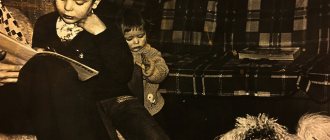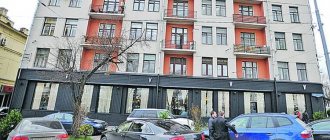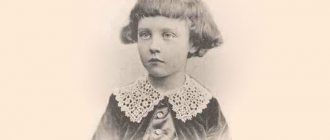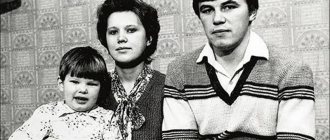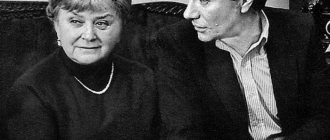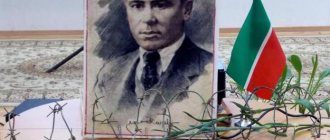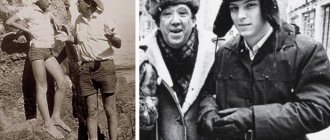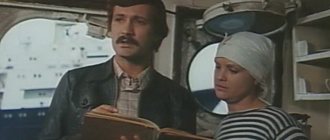Biography
Andrei Voznesensky is a Soviet poet of the sixties, publicist, and songwriter. Despite the cool attitude of the authorities towards the poet’s work, in 1978 Andrei Andreevich was awarded the USSR State Prize. Entered the galaxy of classics of the 20th century.
Andrei Andreevich Voznesensky was born in May 1933 in the capital. His father, a hydraulic engineer by profession, built the famous Bratsk and Inguri hydroelectric power stations. Later he became a professor and headed the Institute of Water Problems.
Songwriter Andrei Voznesensky
The future poet spent his early childhood years in the town of Kirzhach, Vladimir Region, where his mother Antonina Sergeevna was from. Andrei’s older sister, Natasha, also grew up in the family.
The outbreak of the Great Patriotic War and the subsequent evacuation forced 8-year-old Andrei and his mother to move to Kurgan, where the boy went to school. Voznesensky later shared that although the evacuation threw him into a hole, “what a kind hole it was.”
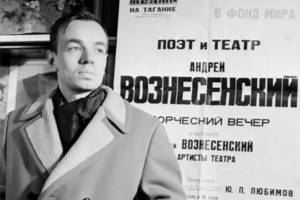
Andrei Voznesensky in his youth
In Moscow, Andrei Andreevich graduated from one of the oldest schools in the capital, where Andrei Tarkovsky also studied. The boy began writing poetry early, and at the age of 14 he dared to send some of them to his favorite poet Boris Pasternak. He appreciated the works of his young colleague very highly, and they became friends. Pasternak's influence on Voznesensky was enormous.
After receiving the certificate, Andrei Voznesensky became a student at the architectural institute. Andrei went to a prestigious university at the insistence of Pasternak, who was afraid that the teachers of the literary institute would ruin Voznesensky’s talent. In 1957, having received a diploma of higher education, the poet celebrated this event with the lines: “Farewell, architecture! Burn widely, cowsheds in cupids, toilets in rococo!..” Voznesensky never worked in his specialty.
Literature
The creative biography of Andrei Voznesensky developed rapidly. In 1958, his poems were published for the first time. They turned out to be bright, rich in metaphors, sound effects and a complex rhythmic system. Each line had a subtext that was unusual and new for that time. Andrei Andreevich’s poetry was influenced not only by Boris Pasternak, but also by the work of Vladimir Mayakovsky and the futurist Semyon Kirsanov.
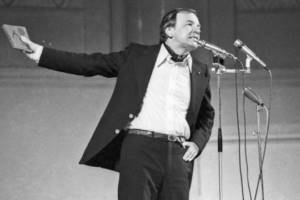
Andrey Voznesensky
Voznesensky’s debut collection of poetry was published in 1960. It was called "Mosaic". For criticizing the government and the Soviet system, the young poet immediately found himself in disgrace. His works were placed on a par with the same “unformatted” poems of the “sixties” Evgeniy Yevtushenko and Bella Akhmadulina. The editor who allowed Voznesensky's collection to be published was miserably fired from his post, and the circulation was barely saved from destruction.
However, all the unpleasant circumstances that accompanied the publication of the first book did not frighten Voznesensky. A few months later, a second collection was released, called “Parabola”. It immediately turned into a bibliographic rarity, although it was published in a huge circulation. Andrei Andreevich began to be invited to closed evenings, where equally disgraced colleagues read their works. At the same time, poets glorifying the Soviet system made Andrei Voznesensky the hero of poetic caricatures.
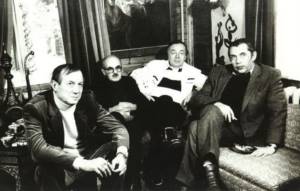
Evgeny Yevtushenko, Bulat Okudzhava, Andrey Voznesensky and Robert Rozhdestvensky
Nikita Khrushchev took up arms against Voznesensky. He set out to expel the inconvenient writer from the country, but after a personal request from John Kennedy, the secretary general left the poet alone. Among Voznesensky's admirers was Robert Kennedy. He even translated the works of the Soviet poet into English.
At Kennedy's request, Andrei Andreevich began to be released abroad. In America, Voznesensky met his colleague Allen Ginsberg, the famous playwright Arthur Miller and Hollywood film star Marilyn Monroe, to whom he then dedicated a poem. The poet visited many European countries, where his talent was revered and his poetry was loved.
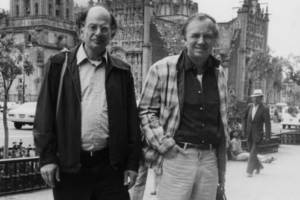
Allen Ginsberg and Andrei Voznesensky
In 1962, Voznesensky released a new collection called “Triangular Pear,” which caused a new wave of indignation among government officials. The poet is criticized and humiliated, devastating articles by critics are published in newspapers, but the people love him. The works of Andrei Voznesensky are reprinted and published in “samizdat”, passed on to each other “under the counter.”
The poet works tirelessly. Every year Voznesensky delights his admirers with a new collection of magnificent poetry. The romantic poet glorifies the feeling of love in the poems “Do not return to former lovers”, “Dream”, “Romance”, “Waltz by Candlelight”. Each time, the emotions born in the lines of works about love, like a pendulum, tend either to the pole of universal love, or to the pole of comprehensive tragedy.
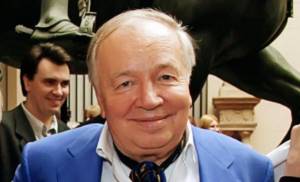
Songwriter Andrei Voznesensky
In 1981, Lenkom’s production of the rock opera “Juno and Avos” with a libretto by Andrei Voznesensky and music by Alexei Rybnikov thundered throughout Moscow. The vocal numbers “I will never forget you” and “Hallelujah” made a deafening impression on the audience. The hall was crowded from the first days of the performance. The situation was somewhat complicated by the publication in the foreign press of an article about the production, after which the Soviet government for a long time did not allow the theater troupe to go on tour with the rock opera abroad, and also prevented the distribution of the record.
The rock opera “Juno and Avos” was not the first theatrical embodiment of Voznesensky’s poetry. The Taganka Theater sold out the production of the poetic cycle “Anti-Worlds” to the music of Boris Khmelnitsky and Vladimir Vysotsky.
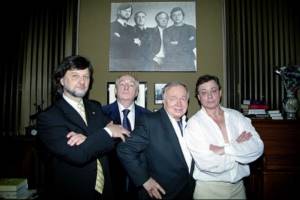
Alexey Rybnikov, Mark Zakharov, Andrey Voznesensky and Nikolay Karachentsov
The poet left 8 poems to his descendants, among which are “Lonjumeau”, “Oza”, “Ditch”. The writer dedicated the work “Andrei Polisadov” to his great-grandfather, the Murom archimandrite. The last poem, the dimensionless prayer sonnet “Russia is Risen,” appeared in 1993 on the pages of the “Friendship of Peoples” publication. Voznesensky’s literary heritage also includes memoir prose and journalism. The only major prose work by Andrei Andreevich, “Foremen of the Spirit,” appeared in 1984.
Today Andrei Voznesensky is familiar with his poems, which have turned into popular musical hits “The girl is crying in the machine gun”, “Give me back the music”, “I’ll pick up the music”, “Dance on the drum”. And the song “A Million Scarlet Roses” performed by Alla Pugacheva is rightfully considered the main hit of the Soviet era. Composers Raymond Pauls, Oscar Feltsman, Mikael Tariverdiev, Igor Nikolaev, Stas Namin, Evgeny Martynov created their masterpieces based on Voznesensky’s poems.
Voznesensky lived with his family in the famous village of Peredelkino. His house was located in close proximity to Pasternak's dacha. At one time, the Voznesensky house-museum was presented with a portrait of their mentor, which Andrei made back in the 7th grade during a labor lesson, using a small photo of Pasternak. Every year, a grateful student visited his dacha on the teacher’s birthday and death day. Voznesensky managed to outlive Pasternak by 50 years and two days.
Andrey Voznesensky - biography, photos, poems, personal life of the poet
Name: Andrey Voznesenskiy Date of birth: May 12, 1933
Date of death: June 1, 2010
Age: 77 years old
Place of birth: Moscow
Place of death: Moscow
Occupation: poet, publicist, artist and architect
Marital status: was married to Zoya Boguslavskaya
Andrei Voznesensky - biography
Everyone knows Andrei Andreevich as a poet and publicist. Few people know that he was a wonderful artist and even an architect. How did his biography develop that allowed Voznesensky’s multifaceted talent to be revealed so comprehensively?
Childhood years, the poet's family
Voznesensky was born in Moscow into the family of an engineer. My father participated in the construction of the Bratsk and Ingul hydroelectric power stations. He later received the title of professor. And he was offered to head an institute that studied and trained specialists in water problems. Due to the fact that his father was often called to construction projects, little Andryusha lived in his mother’s homeland in the Vladimir region. In addition to Andrey, his little sister grew up in the family. When the boy was 8 years old, the war began, and he and his mother were evacuated to Kurgan, where he attended school. He completed his studies at a school in Moscow. I felt rhyme very early, and at the age of 14 I sent my first works to Boris Pasternak. This brought the two young people very close for a long time.
Study of Andrei Voznesensky
When Andrei received his certificate, he did not think long and entered the institute to become an architect. All children of educated parents did this, because it was considered prestigious to train their offspring in technical professions. Having honestly studied at this educational institution and received a diploma, he decided to forget about architecture. And so it happened, he never thought about his profession again. But he still managed to become the author of a monument built in honor of the historical annexation of Georgia to Russia (its co-authors were the famous sculptors Konovalov and Tsereteli).
His biography of the poet began. Poems began to be published, critics noted the brightness and richness of Voznesensky’s poetic lines. He introduced subtext into poetry, which could be found in almost every poetic line. It was not only Pasternak who influenced the syllable, meaning and rhyme of the aspiring poet. Andrey very eagerly listened to the work of Vladimir Mayakovsky. It seemed very strange that being carried away by the poetry of the poet-tribune of the revolution and perestroika, Voznesensky’s first collection of poetry was harshly received by literary critics. It was seen that the young poet criticized the existing system and Soviet power. The editor who published the collection was kicked out.
The further fate of the poet
Yes, the poet fell into disgrace, but continued to create. Soon he wrote a whole second collection of poems; it was published in large quantities, but there wasn’t enough for everyone who wanted to have it. Since then, not a single creative evening has taken place without Voznesensky’s participation. Khrushchev hated the poet, but by pure chance he acquired Robert Kennedy among Voznesensky’s talent fans, he abandoned the idea of expelling Andrei from the Soviet Union. The poet once arrived in America and made many useful and pleasant acquaintances. In particular, he knew Marilyn Monroe. And in his homeland, the poet continues to be out of favor with the authorities, but he is a favorite among the people.
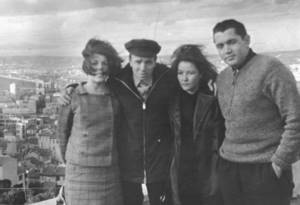
Poems are rewritten and passed on to friends and acquaintances. If someone says that they don’t know a single poem by Andrei Voznesensky, they will be lying. Many of his poems were set to music and became hits: the wonderful songs “Give Me Back the Music” and “A Million Scarlet Roses”, the famous rock opera “Juno and Avos”. Now many will probably be surprised and say that they never suspected that these were poems by a famous Soviet and Russian poet. Yes, yes, that's exactly it. And the wonderful playful “Girl Crying in the Machine”? This also belongs to the pen of Andrei Andreevich.
Andrei Voznesensky - biography of personal life
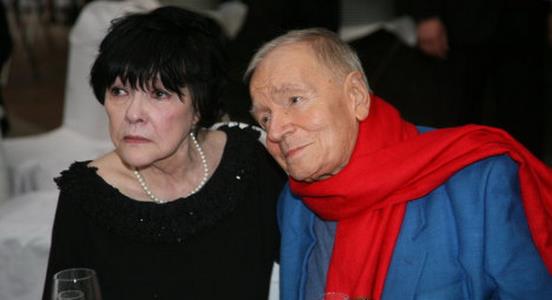
Creative personalities attract each other. The poet's first wife was Bella Akhmadulina. At that time, she was already married to Yevgeny Yevtushenko, but the outbreak of passion allowed her first marriage to fall apart.
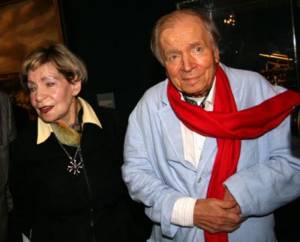
The poetess, playwright and prose writer Zoya Boguslavskaya also became the poet’s real muse. They lived with Andrei Voznesensky side by side for 50 years. There were rumors that the poet had an affair with actress Tatyana Lavrova, but the heart of a loving woman, such as his wife Zoya, was able to forgive everything. But thanks to this romantic feeling, the brilliant work “Juno and Avos” was born. There were no children in the marriage, which lasted a very long time.
Lyrics (Voznesensky)
(The poet’s last interview before his death)
[media=www.youtube.com/watch?v=PWCUgTrMQ_M]
Andrei Voznesensky - illness and death
The poet's arm and leg muscles began to weaken. The diagnosis was terrible - Parkinson's disease. The stroke brought paralysis of the arm, and the legs did not move. The second stroke had other consequences - my voice disappeared. The poet was operated on in Munich. But the third stroke turned out to be the last. Voznesensky died at his dacha in Peredelkino; by the way, his house was next to the estate of Boris Pasternak. There he spent a lot of time with his wife Zoya Borisovna.
Throughout his creative biography, Andrei Voznesensky received many awards. International and State Prizes, two Orders, a Badge of Honor, was an honorary member of more than one Academy. All the awards were deserved, since all the poet’s works were loved by the people, and this is the highest praise for the creator.
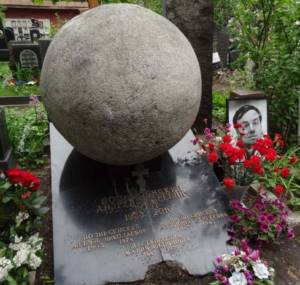
Author bio: Natsh
Personal life
The first wife of Andrei Voznesensky was Bella Akhmadullina. The poetess left her husband Yevgeny Yevtushenko for him. But Voznesensky and Akhmadullina did not live long. There is a version that the collection “Triangular Pear” received its name because of this love triangle.
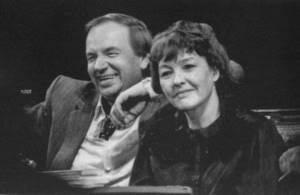
Andrey Voznesensky and Bella Akhmadullina
The personal life of Andrei Voznesensky for almost half a century was connected with another woman, a devoted muse and keeper of the family hearth, Zoya Boguslavskaya, a prose writer, playwright and poetess. At the time the poet met his future wife, Zoya was an accomplished writer; she had a son growing up in a prosperous marriage. But the love for the poet turned out to be stronger.
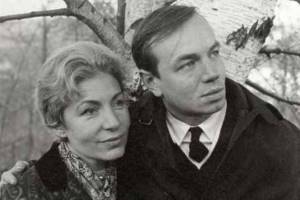
Zoya Boguslavskaya and Andrei Voznesensky
There are rumors about another novel by Voznesensky, to which his wife Zoya at one time had to turn a blind eye. Rumor has it that Andrei Andreevich was in love with actress Tatyana Lavrova. Allegedly, the verses from the rock opera “Juno and Avos” “I will never forget you” are dedicated to this woman. This novel was described in one of Vasily Aksenov’s stories.
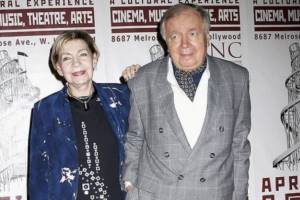
Zoya Boguslavskaya and Andrei Voznesensky
However, the poet lived most of his life with Zoya Boguslavskaya. There were no children in this marriage. But Zoya Borisovna was destined to be with her husband until the last minutes of his life.
"Juno and Avos"
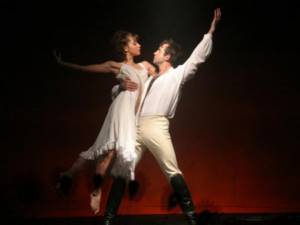
In the 1970s and 80s, Voznesensky made his contribution to popular culture by creating the first Russian rock opera, Juno and Avos. It was staged at the Moscow Lenkom Theater in collaboration with composer Alexei Rybnikov and director Mark Zakharov. “Juno and Avos” became the most popular Russian rock opera of all time. More than a thousand performances have been staged based on it. The opera became a bestseller with Nikolai Karachentsov and Alexander Abdulov in the leading roles. Voznesensky wrote such international hits as “A Million Scarlet Roses” and other popular songs in collaboration with composer Raymond Pauls and singer Alla Pugacheva. He also created a cycle of intimate romantic songs in collaboration with composer Mikael Tariverdiev.
The poetry of Andrei Voznesensky is largely experimental, always new and at the forefront of creative searches. Thanks to his training as an architect, architecture's demands for structural harmony and contrast seemed to be present in his poetic design. The works represent a unique synthesis of deep lyricism and deep philosophical concepts, musical and sounding at the same time like a powerful warning bell. His innovative poetry excited readers, but irritated authorities and was criticized by Orthodox Soviet writers. Voznesensky remained true to himself and attracted worldwide attention as the creator of powerful verse and symbols of youthful defiance. His skill, experimentation and depth as a poet have earned him respect throughout the world, and his works have been translated into numerous languages.
Death
The first alarm bell for the poet sounded in 1995. Andrei Voznesensky was found to have the first signs of Parkinson's disease. The writer's muscles in his throat, arms and legs began to weaken.
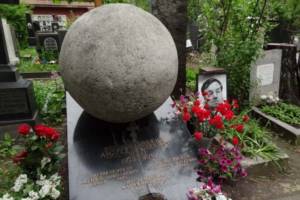
The grave of Andrei Voznesensky
In 2006, Voznesensky suffered his first stroke, which resulted in arm paralysis and problems with his legs. In 2010, another stroke and complete loss of voice. In the spring, the poet was operated on at a Munich clinic. But on the very first summer day, when Andrei Andreevich was already in Peredelkino, the third stroke struck, which the poet could not survive. Andrei Andreevich was dying in the arms of his wife, to whom he whispered new lines of poetry before his death.
The famous writer was buried at the Novodevichy cemetery, where the bodies of his parents rest.


